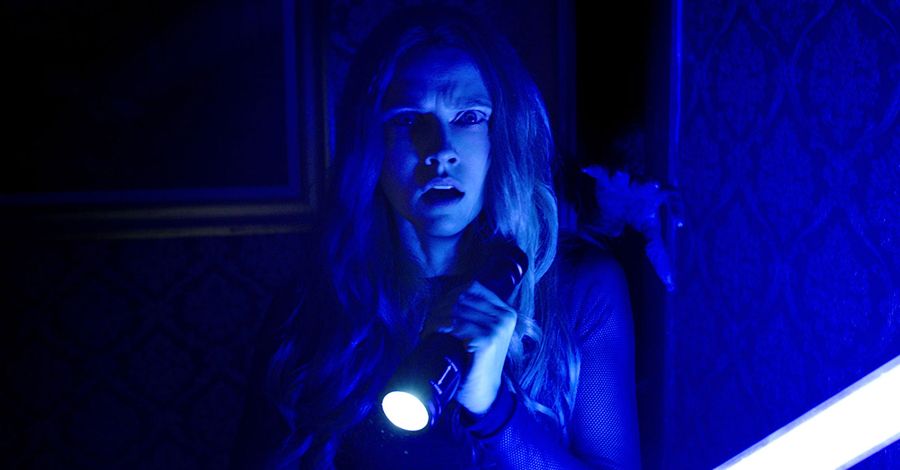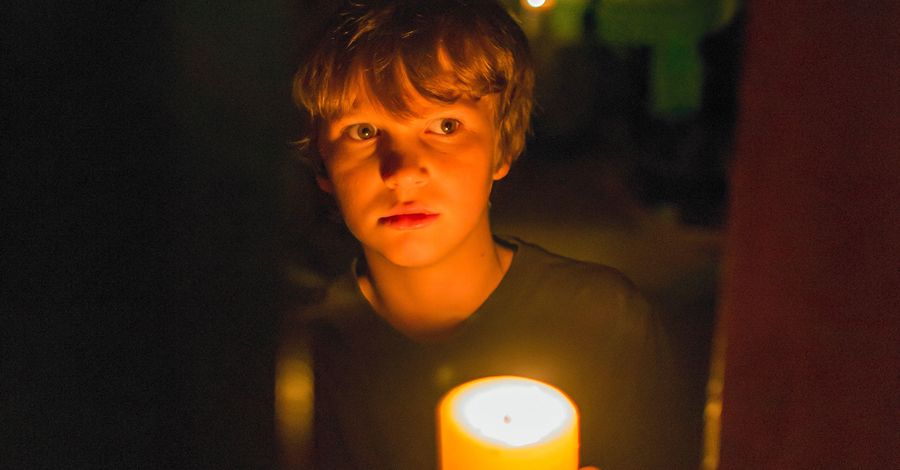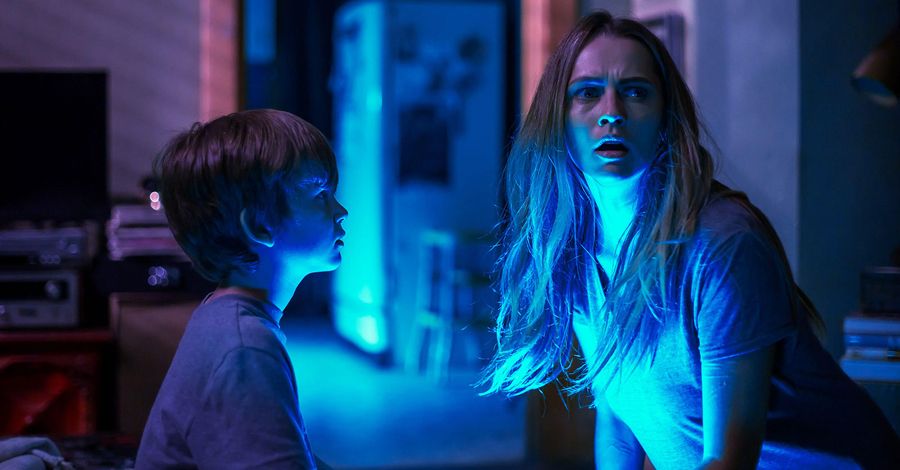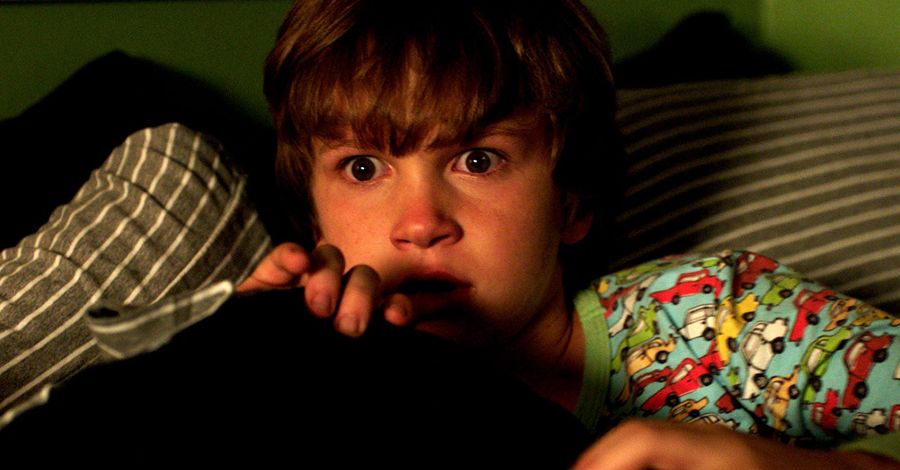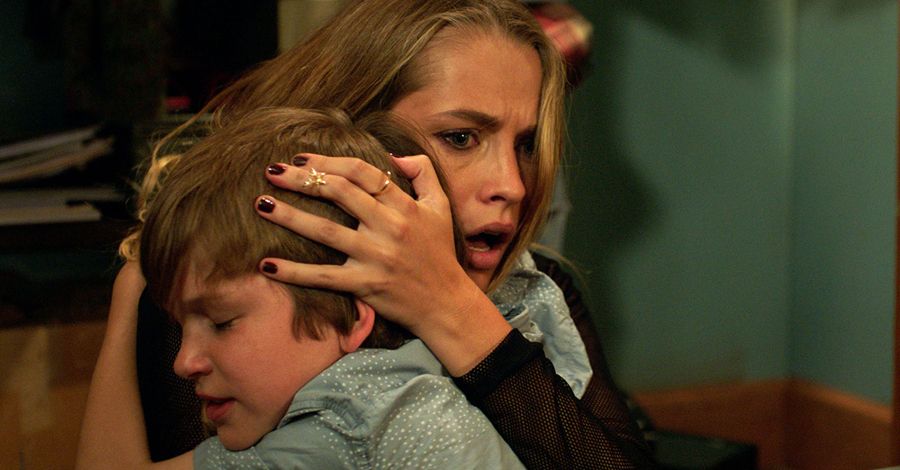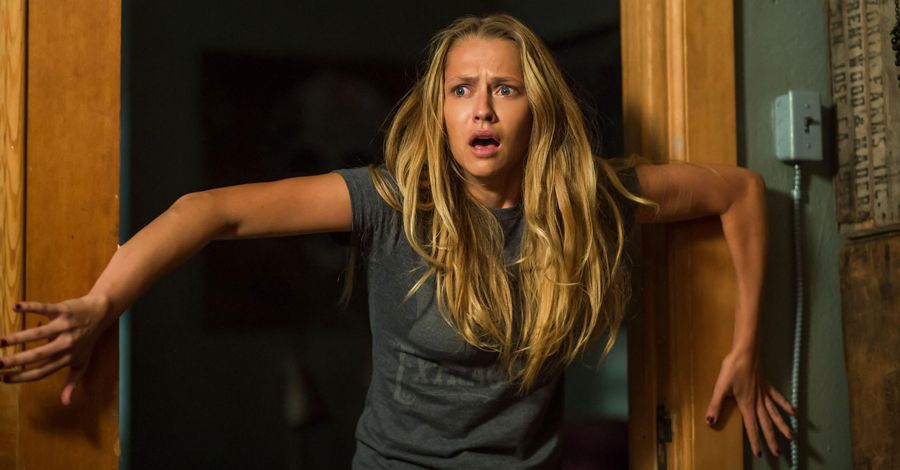Screenwriter Eric Heisserer wants to shed a little light on the darkest and scariest corners of the human psyche – and maybe create an iconic horror star in the process.
After successfully hitting his stride with a string of franchise-minded horror properties – including remakes of “A Nightmare on Elm Street” and “The Thing” and the fifth “Final Destination” film – Heisserer has ventured into a fresh but still fright-filled territory, penning the screenplay for “Lights Out.”
Built upon the premise of the chilling short by Swedish filmmaker David F. Sandberg, who also directs the feature, “Lights Out” centers on a mysterious, murderous entity that can operate only in darkness. The film sets itself apart for both its compelling and allegorical storyline and its aversion to modern horror tropes.
And, as Heisserer reveals to SPINOFF, he’s taking professional steps into worlds familiar to comic book and horror fans – including “The Sandman,” Valiant Comics properties and the hotly anticipated films in the Universal Monster Universe – as well as his own original genre-oriented material, with next fall’s “Arrival.”
Spinoff Online: I know you were initially reluctant to take on “Lights Out,” building a full-length feature out of a very short film, but once you dug into it, it must have been a real treat: First, as a technical exercise to figure out how to do it, and then including deeper elements that were important to you. Tell me about the process of figuring the puzzle pieces all out.
Eric Heisserer: Absolutely. I think the most reassuring meeting I had was very early on when it was me and it was David, Lawrence [Grey] and James [Wan, the producers], and we all talked about the type of horror movies that we don’t like – some of which we had been involved in making, it just ended up showing up as something we didn’t want to do. Or stuff that we really loved out of horror, like what really scared us, and what also meant a lot to us even if it wasn’t a horror movie. What do we like out of movies no matter what the genre?
And gathering all of that, I realized for the first time in a long time, I got to write something very scary that was also my kind of movie. And that’s such a liberating thing, especially in a time when I didn’t have the bandwidth to handle something that would be a slow development process. I had a small window to write this. I was in the middle of working on some Sony properties – the comic book properties for Sony – and yet I couldn’t get out of my head.
So it was a fast process, and it was streamlined because we all wanted to make the same movie. And we then as a team, when we got the script where we wanted, which also happened very fast, we just went into New Line and said, “This is the thing we want to make. Give us the money to make it, or say no. And it’s fine to say no, but don’t take it and then turn it into something else, because this is what we’re ready to shoot.”
You wrote this first as a straighter dramatic storyline, and then you started peppering in the horror scares. What were the visceral scares that came from some place within you, where once you got that scene you’re like, “Oh, yeah, that’s going to scare the crap out of people”?
[Laughs] I think when I knew it worked was when early on, the scares really started with “Did I really see that or not?” Those moments of like, “Does it work or not?” I mean, “Is it real or not?” That also helped. Anytime I had a scare that started with, on the page I would write, “How many places in the house, or how many places in the location, were dark? And were so dark that something could be lurking there, but you didn’t know what.”
I started calling out, “Here are all the dark places, and I’m never going to mention whether or not Diana is there until I absolutely have to.” So I really scared myself. I kept paying attention to how to light this thing on the page and get a description and narrative, and knowing that that had to be translated to what David could do with it.
When you start writing about just paying attention to how things are dark, then you pay attention in real life. You’re walking around your house going, “There are way too many dark places in the house!”
You were on set a lot. Because the writer’s not always invited to that particular party, what was fun about being there and helping be a part of when the shots were being set up and things are being discussed and being right there for that?
It was so good for me because what works on the page doesn’t always work in execution. And there were quite a few times where Teresa [Palmer] or Maria [Bello] or Alex [DePersia] would be struggling with a line and I realized, “OK, the way they’ve developed their character and how they behave and just how they work as actors, this isn’t quite right.” Like, it reads well on the page, but it doesn’t work in the scene.
So I would rush over and say, “David, can I talk? Do some adjustment. The first thing that I always tell the cast is like, “All right: I fired the writer. Producer-me is here. Let’s do some options. Let’s do some alternatives. What about this? What about that? What are you thinking on this?”
And they were all team players. They were all ready to go and just work some options.
And I wouldn’t have that opportunity if I weren’t there. And I had to be the hardest judge of that too and say, “OK, I’m not going to be precious. Obviously, this doesn’t quite work. Let’s adjust it.”
The second advantage is just to see how all of it comes to life, and know that you can still write, even if it’s just sort of improvisational. You can still write to enhance a scene. If there’s something that suddenly works really, really well, and you’re seeing that in video village and realize, holy crap, that actor or this behavior, this motion of Diana is so captivating, we’ve got to find a way to either enhance it right here, or repeat it elsewhere. And having just another set of eyes that has the right writer brain with you can be an incredible toolbox.
What did you enjoy about process of creating an original horror character that, with any luck, we’ll see people dressed up as for Halloween and walking around at Comic-Con next year? What was in your head trying to craft a character like that – and especially to make it a woman?
I would say that Diana was always Diana because David saw her that way. And I gelled with that from the start. It made it easier for me to write for her because a woman monster can give you a space of a maternal sensibility that you can’t get with a Jason Voorhees or some other character like Michael Myers.
With Diana, I bought how she might have lured Sophie into this kind of relationship that she thinks she’s having. And it also helps that she’s kind of a dark mirror for Sophie. So a masculine energy I just don’t think would work for her on sort of a thematic or emotional level.
And what I’m most excited about is that she is new. We don’t have a lot of new monsters. We don’t like do that. We’re all like, let’s make her just a demon. Let’s make her just a ghost. Now and then our Japanese horror remakes allow us to get a little fuzzy, but it still at the end of the day comes down to she’s a tortured soul from blah blah blah, or it’s an undead creature that we’re very familiar with. To bring something brand new that certainly requires more heavy lifting on backstory or a little bit of mythology so the audience knows it’s different, but that’s so refreshing. Like, why don’t we make new stuff like that?
Also refreshing was that this is a self-contained story. These movies often now usually end on a note of “Come back in a year and see what happens next!” But also, I do see that there’s a franchise-able quality to this, potentially. What were you guys thinking about that element of it?
We just wanted to make the story in this movie work, and have a resolution at the end of it so that audiences could be satisfied. There’s something about denying satisfaction from the audience when you tease some sort of sequel. When you put the button at the end saying, “Next year, come back, save your seat,” that kind of thing. We didn’t want to cheapen that.
So everybody was very for that, but it was James I think who was like, “Look, guys, I know, yes – but you’ve built this iconic character that has a lot of room to grow, and there’s a lot more to explore with her, so just keep that in mind.” That is what he would tell us at every step, was just like, “Think about what else you want to do with her, and just have that in a little notebook somewhere.”
You’ve got this relationship with Warner Bros. and New Line, and you’re involved in the “Sandman” project.
I am, yeah. It’s early days, but yeah.
And we got glimpses of the Dream King in this movie, in posters on walls here and there.
Yes!
What drew you to that property and what has you creatively energized about that?
I’ve been a fan of [Neil] Gaiman in general, and Sandman in particular for, gosh, 25 years now. I’ve always been amazed by the level of art and the complexity of the characters that are so steeped in sort of iconic mythology. The way that he humanizes them, who otherwise very alien-type kind of characters and creatures, is just, it’s candy for me.
And when I had an opportunity to swing for this – and I knew that I was one of like 50 writers that was going to swing for it, and of course it’s been in development for forever and a day – I just knew that I would want to embark on the strangest script I’ve ever written before to work on “Sandman.” This was about, sadly, this was like seven or eight months after, I think, Joseph Gordon-Levitt had departed, and it was just a sort of a bare naked property.
But the first thing was to meet Neil and sit down with him and ask him everything that he’s seen over the development of this property. What works, what doesn’t, and get a list of things that Neil absolutely wanted to make sure we retained in moving forward. And thankfully New Line was very encouraging of that. So that was the biggest meeting I’ve had in the past couple of years was sushi with Neil.
So is there still good forward momentum on the project? Is it still moving ahead at pace?
It’s moving at pace.
When Joe initially jumped on, it got a lot of buzz.
It did get some buzz, but that when it was Warner’s proper before it got all shuttled. Yeah, I don’t know about the political side of things. I know it’s moving forward on my end. Where it goes from there, who knows?
Can you talk about anything from the canon that you’re particularly thinking, “I’ve got to get this in there!” Like, “This is important to me to try to include”?
It’s very important for me to include at least a little appearance of Death, if not making her a more important character. Death is a very important character.
Another film you’re working on “Van Helsing” in the upcoming Universal Monsters series of interconnected films. What’s the status of that with you right now? Where are you with that project?
John Spaihts and I are working on it together, and we’re in the midst of doing a rewrite for Universal on that. We’re doing one more step as planned. And we hope to wrap that up the next month or so.
As a screenwriter, what’s been the neat opportunity in that particular shared universe setup?
The neat opportunity there is that it behaves very much as a TV writers’ room, in that you have this cabal of writers that get together and talk about the superstructure of the world, of that universe. And then everybody else’s perspectives through that, of how they want to see each of these characters live. You can’t have them all painted with the same brush.
They’re unique characters, the various monsters that are in there, and not all of them are monsters. There’s an interesting sort of separation of the supernatural monsters that are cursed in some way, and then the science monsters that are birthed out of just human invention gone wrong.
So there’s a lot to explore in those areas, as well as Van Helsing for me, who was just my favorite among them because he’s the radical. He’s the guy who says, “We have let more powerful people or figures to try and solve our problems for us. I’m going to kill all of those powerful figures so that we humans solve our own problems.”
So in the universe, is he a bit of a unifying figure – in the way that, say, Nick Fury in the Marvel movies is?
He may evolve to that, but right now he’s the John Wick of that world. You put him in the room with Dracula, or the Wolfman, or Jekyll/Hyde, or any of these people, his first instinct is, “I’m going to murder you.”
It must be a really great time for you as a screenwriter to have the opportunity to play in these different toy boxes. Is there also a little bit of, I want to make my own thing that somebody can use as their toy box in 30, 40, 50 years?
Always. Always. I made a vow to myself six years ago that I’d write one original thing on spec every year, and I’ve stuck with that. Arguably, those are the hardest things to get made.
Right now the time and mood of the business is not friendly to those kinds of projects.
It really isn’t. Even with someone who has a track record like I do now, I had hoped that it was going to be a case of like, “One for them and one for me.” It’s not turned out to be that. I managed to do something of my own, but I had to direct it to get it made, and it was low budget. Not all of my ideas are that. In fact, a lot of my material is very upscale in terms of numbers.
There’s a movie coming out this November, that while it’s based on a short story, it was very much a part of me. I was very passionate about it. I’ve been carrying around that story for years for over a decade. I first started working on it in 2010. In order to get that one made, it took Denis Villeneuve, who’s the director, and Amy Adams as the star, and it had to have a lot of pedigree to it in order to finally see production.
That’s “Arrival.” How big of a movie is it ultimately? Is it a grand scale kind of thing?
I liken it to “Close Encounters of the Third Kind,” or “Contact.” It’s that type of movie where it’s still big in scale, but it doesn’t necessarily, it’s not a $200 million movie.
From listening to the conversations at the round tables and talking to you now, it sounds like that you know very well the power of passion for a project. Tell me about maintaining that in the business of Hollywood in 2016. What are the opportunities and the challenges for a screenwriter with material they believe in?
It’s a tough dance. I mean, you have to be fully invested. And when something falls through, you have to be able to divorce yourself from it. I’ve had a lot of breakup drinks where I just go and I have to hang my head in shame and find a way to get over something that I was very passionate about. And I’ve had my share of taking gigs because I needed to pay the rent, and I was living off a credit card, and that’s not good either.
Trying to do something without passion ends up with you shooting yourself in the foot because you just can’t perform your best. So I think doing something on spec every year has helped keep me passionate about things, and keep me productive. When I find something like “Lights Out” where I get to do all the things that I wanted to do, and I get these other creative people who are just adding to it and improving it every step of the way, it’s like the best thing ever. So it can happen. There are success stories. And I would say passion, first and last.
Just to close out, what’s the Sony superhero material you’re involved with?
The Sony stuff was based on Valiant Comics. Yeah, so I worked on “Bloodshot” and then “Harbinger.” I don’t think I was the first writer on “Bloodshot.” But I came in and I pitched my heart out on “Harbinger,” and I carried that title, and I’m very excited about that.
Those are films that like have to stand out as comic book properties that are absolutely not Marvel or DC. They have to be something brand new, and to find that space was exhausting. I wrote probably, after I was done with “Harbinger,” I had written close to 1,200 pages. It was a lot of drafts of that. Just trying to, figuring out where that notch was, but we got there and I’m very excited about it. So hopefully this year we’ll have some movement.
”Lights Out” is in theaters.

